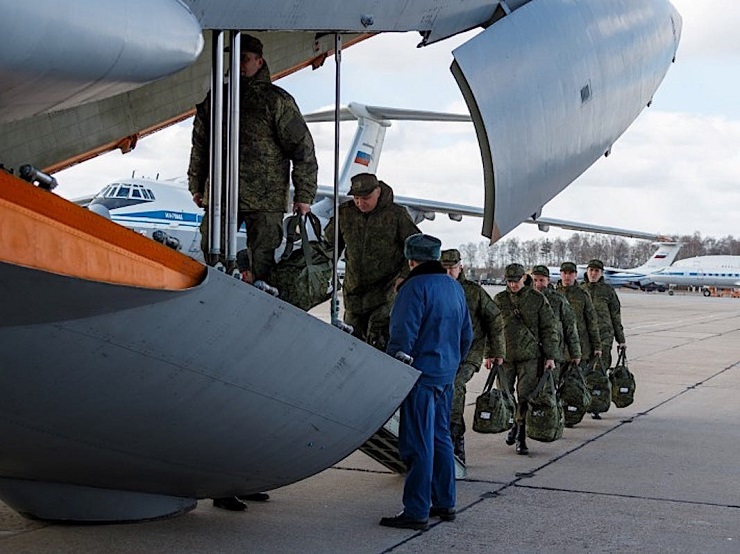When Russian military planes and trucks arrived in Italy to provide relief for communities hit by the Covid-19 outbreak, the Italian government, elected into power by the Italian people, was thankful for the assistance offered by Moscow.
Named officials within the Italian government, including the foreign minister, the minister of defense and the governor of Apulia, Michele Emiliano, publically expressed thanks to Russia for the aid.
But finding any mention of this across the Western media is difficult, often buried deep within articles aimed entirely at smearing Russia for sending aid and depicting Italians as victims of a publicity stunt.
Reuters, in a smear piece published by the New York Times and aimed at vilifying Moscow, still had to admit regarding Russian aid that Italians were grateful, noting:
“There are no new geopolitical scenarios to trace, there is a country that needs help and other countries that are helping us,” Foreign Minister Luigi Di Maio was quoted as saying by Italy’s Il Corriere della Sera newspaper on Thursday.
Despite Italy being capable of speaking for itself and bringing up any suspicions (if they had any), the West decided to step in and speak for Italy instead.
Sneering and Smearing
Western headlines are flooded with scorn for both Russia and the aid they sent, completely indifferent to how Italians themselves perceived the gesture.
Articles like Bloomberg’s “Italy Questions Russians Over Their Goodwill Virus Gestures,” admit several paragraphs in that officially, Italy was grateful for the aid, noting:
“Our country can only be grateful” for the solidarity of many countries, including Russia, the Italian defense and foreign ministries said in a joint statement Friday.
Yet claims that “Italy questions Russia” suggest the entire nation is suspicious of the aid. Upon reading Bloomberg’s article, the only source cited is a single article in the Italian newspaper “La Stampa.” It is hard to believe an article in “La Stampa” constitutes all of “Italy.”
According to the pro-Western Moscow Times in their article, “80% of Russia’s Coronavirus Aid to Italy ‘Useless’ – La Stampa,” also entirely based on the La Stampa article, its admits La Stampa’s information came from an “unnamed source.”
Other articles, like the BBC’s “Coronavirus: What does ‘from Russia with love’ really mean?,” Foreign Policy’s “Beware of Bad Samaritans,” and Forbes’ “From Russia With Love? Putin’s Medical Supplies Gift To Coronavirus-Hit Italy Raises Questions,” all used similarly disingenuous tactics to depict the Russian aid as somehow sinister and unwanted.
The Guardian in its article, “Coronavirus: Russia sends plane full of medical supplies to US,” explains:
Critics likely to claim Moscow will exploit goodwill gesture as public relations coup.
France 24 in headline alone makes Western criticism even clearer, claiming, “Flying aid to virus-hit Italy, Moscow flexes soft power.“
So by sending aid to Italy, Russia is somehow supposedly flexing its “soft power.”
So How is the West Using Its Soft Power?
The West faced a collective decision. They could have used their own, very substantial soft power to one-up Russia by sending even more aid to Italy and other regions of the globe impacted by the spread of Covid-19.
Instead, they mobilized the entirety of their soft power to sneer and smear Russia’s efforts with Western-funded media fronts writing entire articles doing just that.
The West’s attempts to depict the Russian media reporting on the aid as also somehow sinister rather than simply telling the world what Russia is doing is also particularly surreal.
The Western media itself spends the summation of its own time and energy promoting what their respective governments are doing abroad which usually involves illegal invasions, wars, occupations and interventions… not sending aid.
A Missed Opportunity
Because certain special interests in the West fear some Western governments growing closer to nations like Russia and China in the spirit of cooperation and mutual benefits and derailing the Washington-led “international order” that has prevailed post World War 2, resources have been committed to attacking any development that could spur this process further.
But because these resources have been invested into attacking, even when attacking is not the best option, that is all the West appears capable of doing.
The answer to Russian aid to Italy was Western aid to Italy. The benefit would have been a flood of resources sent to where it was needed and everyone involved enjoying the benefits of lending a helping hand to those who would be grateful in return.
Instead, the West appears to be throwing rocks at a time when others are coming together to help, and throwing those rocks at those who are helping.
Rather than teaching the Italians never to deal with Russia again, it is likely this process is going to remind Italians as to why they’ve diversified their foreign relations outside the West in the first place.
Gunnar Ulson, a New York-based geopolitical analyst and writer especially for the online magazine “New Eastern Outlook”.

